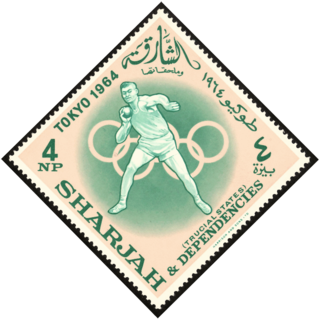
Alfred Oerter Jr. was an American athlete and a four-time Olympic Champion in the discus throw. He was the first athlete to win a gold medal in the same individual event in four consecutive Olympic Games. Oerter is an inductee of the IAAF Hall of Fame.

The men's shot put was one of four men's throwing events on the Athletics at the 1964 Summer Olympics program in Tokyo. It was held on 17 October 1964. 25 athletes from 15 nations entered, with 3 not starting in the qualification round. The maximum number of athletes per nation had been set at 3 since the 1930 Olympic Congress. The event was won by Dallas Long of the United States, the nation's fifth consecutive and 13th overall victory in the men's shot put. His teammate Randy Matson took silver, making 1964 the fifth straight Games the Americans had finished one-two. A second consecutive sweep was prevented when Vilmos Varju of Hungary took third over American Parry O'Brien. Long was the sixth man to win two shot put medals ; Matson would later become the seventh. O'Brien's fourth place finish kept him from being the first man to win four—he had taken gold in 1952 and 1956 and silver in 1960.

The men's discus throw was one of four men's throwing events on the Athletics at the 1964 Summer Olympics program in Tokyo. It was held on 15 October 1964. 29 athletes from 21 nations entered, with 1 additional athlete not starting in the qualification round. The maximum number of athletes per nation had been set at 3 since the 1930 Olympic Congress. The event was won by Al Oerter of the United States, the nation's fourth consecutive and 11th overall victory in the men's discus throw. Oerter became the first man to win three medals in the event, all of them gold. He was only the second person to win three consecutive gold medals in any individual athletics event. It was the third of his four consecutive wins in the event. Ludvik Danek of Czechoslovakia took silver to break up the Americans' two-Games dominance of the discus podium; no non-American had won a medal since 1952. Dave Weill earned bronze to make this the fourth straight Games that the United States had won at least two medals in the event.

The men's discus throw was one of six throwing events on the Athletics at the 1908 Summer Olympics programme in London. The competition was held on July 16, 1908. 42 throwers from eleven nations competed. NOCs could enter up to 12 athletes. The event was won by Martin Sheridan of the United States, his second consecutive victory in the event. The Americans completed their first sweep in the discus throw, with Merritt Giffin taking silver and Bill Horr bronze.

The men's shot put at the 2004 Summer Olympics in Athens was held on 18 August 2004 at the Ancient Olympia Stadium. It was originally planned to hold the discus throw at this venue, but it was discovered that the field was not large enough to accommodate the range of modern discus throwers, and would have posed a danger to spectators. As such, it was decided instead to hold the shot put at the site, despite the fact that the shot put was not contested at the Ancient Olympic Games. All distances are given in metres. Thirty-nine athletes from 26 nations competed.

The men's discus throw was a track and field athletics event held as part of the athletics at the 1912 Summer Olympics programme. The competition was held on Friday, July 12, 1912. Forty-one discus throwers from 15 nation competed. NOCs could enter up to 12 athletes. The event was won by Armas Taipale of Finland, the nation's first medal in the men's discus throw. Richard Byrd took silver and James Duncan took bronze to continue the United States' podium streak at five consecutive Games.

The men's shot put was an event at the 1956 Summer Olympics in Melbourne, Australia. The qualifying round and the final both were held on Wednesday November 28, 1956. Fourteen shot putters from ten nations competed. The maximum number of athletes per nation had been set at 3 since the 1930 Olympic Congress.
The men's shot put was an event at the 1992 Summer Olympics in Barcelona, Spain. There were 26 participating athletes from 18 nations. The maximum number of athletes per nation had been set at 3 since the 1930 Olympic Congress. The event took place on 31 July 1992. The event was won by Mike Stulce of the United States, the nation's first victory in the men's shot put since 1968. His countryman Jim Doehring took silver. Vyacheslav Lykho of the Unified Team earned bronze, the first medal for a Soviet or former Soviet in the event since 1980.

The men's shot put event was part of the track and field athletics programme at the 1924 Summer Olympics. The competition was held on Tuesday, July 8, 1924. 28 shot putters from 15 nations competed. The maximum number of athletes per nation was 4. The event was won by Bud Houser of the United States, the nation's sixth victory in the men's shot put. Glenn Hartranft took silver and Ralph Hills took bronze to complete the Americans' fourth medal sweep in the event.
The men's shot put event at the 2000 Summer Olympics as part of the athletics program was held at the Olympic Stadium on Friday, 22 September. The shot put has been ever present since the beginning of the modern Olympic Games in 1896. Thirty-seven athletes from 27 nations competed. The maximum number of athletes per nation had been set at 3 since the 1930 Olympic Congress. The qualifying athletes progressed through to the final where the qualifying distances were scrapped and they started afresh with up to six throws. The event was won by Arsi Harju of Finland, the nation's first victory in the men's shot put since 1920 and first medal in the event since 1936. Americans Adam Nelson and John Godina took silver and bronze, respectively, with Godina becoming the 12th man to earn multiple shot put medals.

The men's discus throw event was part of the track and field athletics programme at the 1936 Summer Olympics. The competition was held on August 5, 1936. Thirty-one athletes from 17 nations competed. The maximum number of athletes per nation had been set at 3 since the 1930 Olympic Congress. The final was won by Ken Carpenter of the United States. It was the nation's fourth consecutive, and seventh overall, victory in the men's discus throw; it was also the second consecutive Games that the Americans finished with both of the top two places, as Gordon Dunn took silver. Giorgio Oberweger earned Italy's first men's discus throw medal with his bronze.

The men's discus throw event was part of the track and field athletics programme at the 1948 Summer Olympics. Twenty-eight athletes from 18 nations competed. The maximum number of athletes per nation had been set at 3 since the 1930 Olympic Congress. The competition was held on August 2. The final was won by Adolfo Consolini of Italy. It was the nation's first victory in the men's discus throw; Italy had previously taken bronze in 1936. Giuseppe Tosi earned silver to put Italy in the top two places. Fortune Gordien of the United States won bronze, keeping the Americans on the podium in each appearance of the men's discus throw to date.

The men's shot put throwing event at the 1960 Olympic Games took place on August 31. Twenty-four athletes from 16 nations competed. The maximum number of athletes per nation had been set at 3 since the 1930 Olympic Congress. The event was won by Bill Nieder of the United States, the nation's fourth consecutive and 12th overall victory in the men's shot put. Parry O'Brien and Dallas Long took silver and bronze, giving the American team its sixth medal sweep in the event. O'Brien, who had won gold in 1952 and 1956, matched Ralph Rose in coming just shy of a third gold medal. The two remain, through the 2016 Games, the only men to win three shot put medals. Nieder was the fifth man to win two medals.

The men's discus throw throwing event at the 1960 Summer Olympics took place on September 6 & September 7. Thirty-five athletes from 22 nations competed. The maximum number of athletes per nation had been set at 3 since the 1930 Olympic Congress. The event was won by Al Oerter of the United States, the nation's third consecutive and 10th overall victory in the men's discus throw. It was Oerter's second gold medal in the event; he would go on to win four. Oerter was the sixth man to win two medals in the event, and the third to win two gold medals. The United States earned its second consecutive and third overall medal sweep in the event, as Rink Babka took silver and Dick Cochran bronze.

The men's shot put event was part of the track and field athletics programme at the 1952 Summer Olympics in Helsinki, Finland. Twenty athletes from 14 nations competed. The maximum number of athletes per nation had been set at 3 since the 1930 Olympic Congress. The competition was held on 21 July at Helsinki Olympic Stadium. The finals were swept by the United States, with Americans Parry O'Brien taking the gold medal, Darrow Hooper earning silver and Jim Fuchs receiving his second consecutive bronze medal in the event. It was the 10th victory for an American in the event, and the fifth medal sweep for the United States. Fuchs was the third man to win multiple medals in the shot put.

The men's triple jump event at the 1976 Summer Olympics in Montreal, Quebec, Canada, had an entry list of 25 competitors, with two qualifying groups before the final (12) took place on Friday July 30, 1976. The top twelve and ties, and all those reaching 16.30 metres advanced to the final. The qualification round was held in Thursday July 29, 1976. The maximum number of athletes per nation had been set at 3 since the 1930 Olympic Congress.

The men's shot put field event at the 1972 Olympic Games took place on September 8 & 9. Twenty-nine athletes from 19 nations competed. The maximum number of athletes per nation had been set at 3 since the 1930 Olympic Congress.
The men's discus throw event at the 1952 Summer Olympics took place on 22 July at the Helsinki Olympic Stadium. Thirty-two athletes from 20 nations competed. The maximum number of athletes per nation had been set at 3 since the 1930 Olympic Congress. The event was won by Sim Iness of the United States, the nation's eighth victory in the men's discus throw. Defending champion Adolfo Consolini of Italy took silver, becoming the fourth man to win two medals in the event. American James Dillion won bronze.

The men's shot put competition at the 2016 Summer Olympics in Rio de Janeiro, Brazil. The event was held at the Olympic Stadium on 18 August. Thirty-four athletes from 24 nations competed. The event was won by Ryan Crouser of the United States, the nation's first victory in the event since 2004. His teammate Joe Kovacs took silver. Tomas Walsh earned New Zealand's first medal in the men's shot put.
The men's discus throw competition at the 2016 Summer Olympics in Rio de Janeiro, Brazil. The event was held at the Olympic Stadium on 12–13 August. Germany's Christoph Harting succeeded his brother Robert Harting to the Olympic title. Poland's Piotr Małachowski took the silver medal ahead of another German, Daniel Jasinski.
















